Created during the American Civil War, the Medal of Honor is the nation’s highest military decoration awarded to soldiers, sailors, airmen and marines who have at the risk of their own lives above and beyond the call of duty defended against the enemies of the United States.
Since Vietnam, 20 U.S. servicemen have earned the Medal of Honor from the battlefields of Somalia, Iraq and Afghanistan. Eight were awarded posthumously after paying the ultimate sacrifice.
SOMALIA
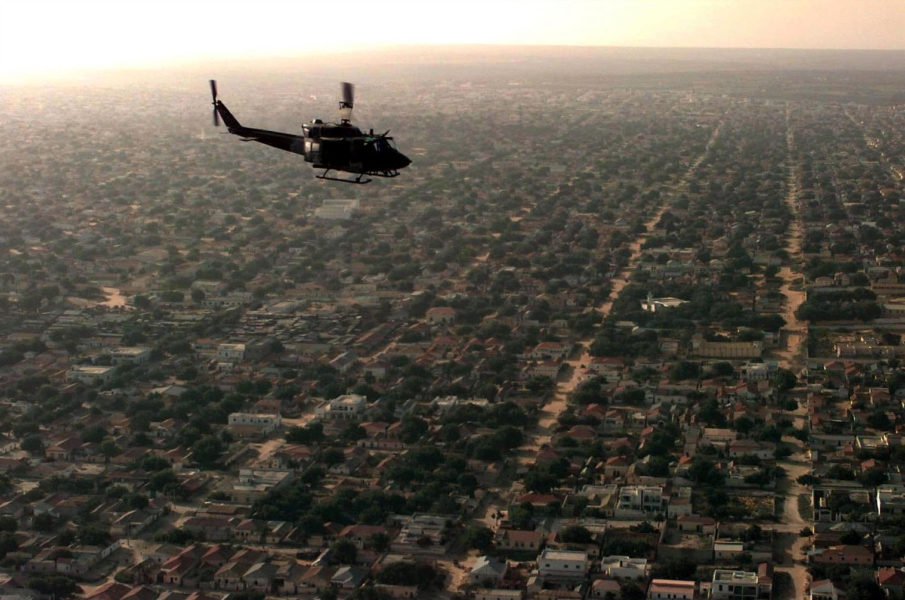
[in_content_ad]
On Oct. 3, 1993, two Delta Force operators earned posthumous Medal of Honors for volunteering to try to save the surviving pilot of one of the downed UH-60 Black Hawk. Though the pilot would be saved, these snipers did not survive the odds against hundreds, if not thousands, of Somali rebels converging on the crash site in Mogadishu.
Army Master Sergeant Gary Gordon
1st SFOD-D (Delta)
Mogadishu Somalia | Oct. 3, 1993
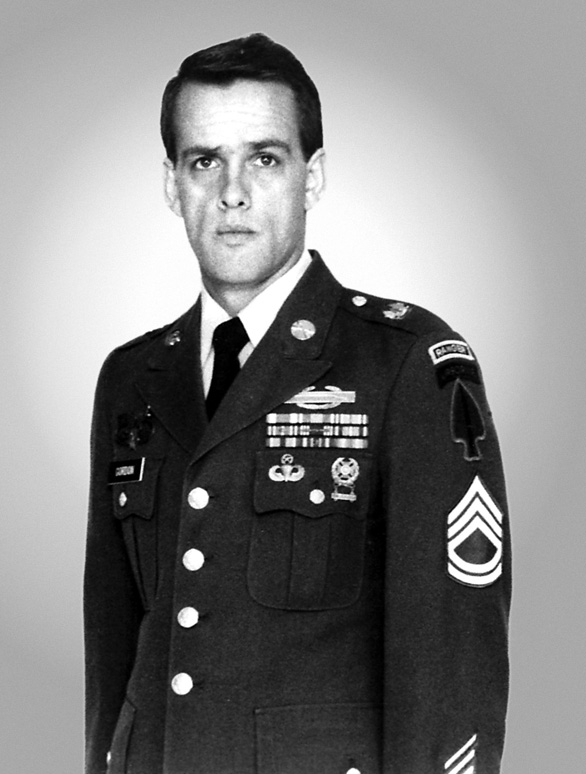
[in_content_ad]
Gordon volunteered to secure a helicopter crash site until help could arrive while under heavy enemy fire. He along with Shughart (next slide) would fight their way to Black Hawk Down armed with only their personal weapons and sidearms against impossible and fatal odds as the streets of Mogadishu were filled with more heavily armed enemy Somalis.
CITATION—Master Sergeant Gordon, United States Army, distinguished himself by actions above and beyond the call of duty on 3 October 1993, while serving as Sniper Team Leader, United States Army Special Operations Command with Task Force Ranger in Mogadishu, Somalia. Master Sergeant Gordon’s sniper team provided precision fire from the lead helicopter during an assault and at two helicopter crash sites, while subjected to intense automatic weapons and rocket propelled grenade fires. When Master Sergeant Gordon learned that ground forces were not immediately available to secure the second crash site, he and another sniper unhesitatingly volunteered to be inserted to protect the four critically wounded personnel, despite being well aware of the growing number of enemy personnel closing in on the site. After his third request to be inserted, Master Sergeant Gordon received permission to perform his volunteer mission. When debris and enemy ground fires at the site caused them to abort the first attempt, Master Sergeant Gordon was inserted one hundred meters south of the crash site. Equipped with only his sniper rifle and a pistol, Master Sergeant Gordon and his fellow sniper, while under intense small arms fire from the enemy, fought their way through a dense maze of shanties and shacks to reach the critically injured crew members. Master Sergeant Gordon immediately pulled the pilot and the other crew members from the aircraft, establishing a perimeter which placed him and his fellow sniper in the most vulnerable position. Master Sergeant Gordon used his long range rifle and side arm to kill an undetermined number of attackers until he depleted his ammunition. Master Sergeant Gordon then went back to the wreckage, recovering some of the crew’s weapons and ammunition. Despite the fact that he was critically low on ammunition, he provided some of it to the dazed pilot and then radioed for help. Master Sergeant Gordon continued to travel the perimeter, protecting the downed crew. After his team member was fatally wounded and his own rifle ammunition exhausted, Master Sergeant Gordon returned to the wreckage, recovering a rifle with the last five rounds of ammunition and gave it to the pilot with the words, “good luck.” Then, armed only with his pistol, Master Sergeant Gordon continued to fight until he was fatally wounded. His actions saved the pilot’s life. In total 50 Somalian bodies were found at the location. Master Sergeant Gordon’s extraordinary heroism and devotion to duty were in keeping with the highest standards of military service and reflect great credit upon him, his unit and the United States Army.
Army Sergeant First Class Randy Shughart
1st SFOD-D
Mogadishu, Somalia | Oct. 3, 1993
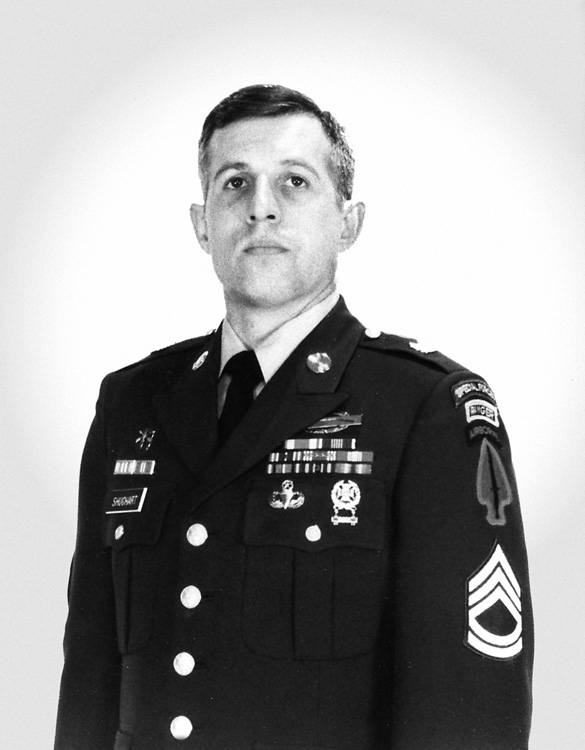
[in_content_ad_ora]
Shughart volunteered along with Gordon (previous slide) to secure the “Black Hawk Down” crash site despite being outmanned and outgunned. He is believed to be the first to die in the attack. His firearms were then put to use by downed Chief Warrant Officer Mike Durant, whom the Somali mob was successful in kidnapping from the crashed helicopter.
CITATION—Sergeant First Class Shughart, United States Army, distinguished himself by actions above and beyond the call of duty on 3 October 1993, while serving as a Sniper Team Member, United States Army Special Operations Command with Task Force Ranger in Mogadishu, Somalia. Sergeant First Class Shughart provided precision sniper fires from the lead helicopter during an assault on a building and at two helicopter crash sites, while subjected to intense automatic weapons and rocket propelled grenade fires. While providing critical suppressive fires at the second crash site, Sergeant First Class Shughart and his team leader learned that ground forces were not immediately available to secure the site. Sergeant First Class Shughart and his team leader unhesitatingly volunteered to be inserted to protect the four critically wounded personnel, despite being well aware of the growing number of enemy personnel closing in on the site. After their third request to be inserted, Sergeant First Class Shughart and his team leader received permission to perform this volunteer mission. When debris and enemy ground fires at the site caused them to abort the first attempt, Sergeant First Class Shughart and his team leader were inserted one hundred meters south of the crash site. Equipped with only his sniper rifle and a pistol, Sergeant First Class Shughart and his team leader, while under intense fire from the enemy, fought their way through a dense maze of shanties and shacks to reach the critically injured crew members. Sergeant First Class Shughart pulled the pilot and the other crew members from the aircraft, establishing a perimeter which placed him and his fellow sniper in the most vulnerable position. Sergeant First Class Shughart used his long range rifle and side arm to kill an undetermined number of attackers while traveling the perimeter, protecting the downed crew. Sergeant First Class Shughart continued his protective fire until he depleted his ammunition and was fatally wounded. His actions saved the pilot’s life. Sergeant First Class Shughart’s extraordinary heroism and devotion to duty were in keeping with the highest standards of military service and reflect great credit upon him-self, his unit and the United States Army.
[in_content_ad_jw_player]
AFGHANISTAN
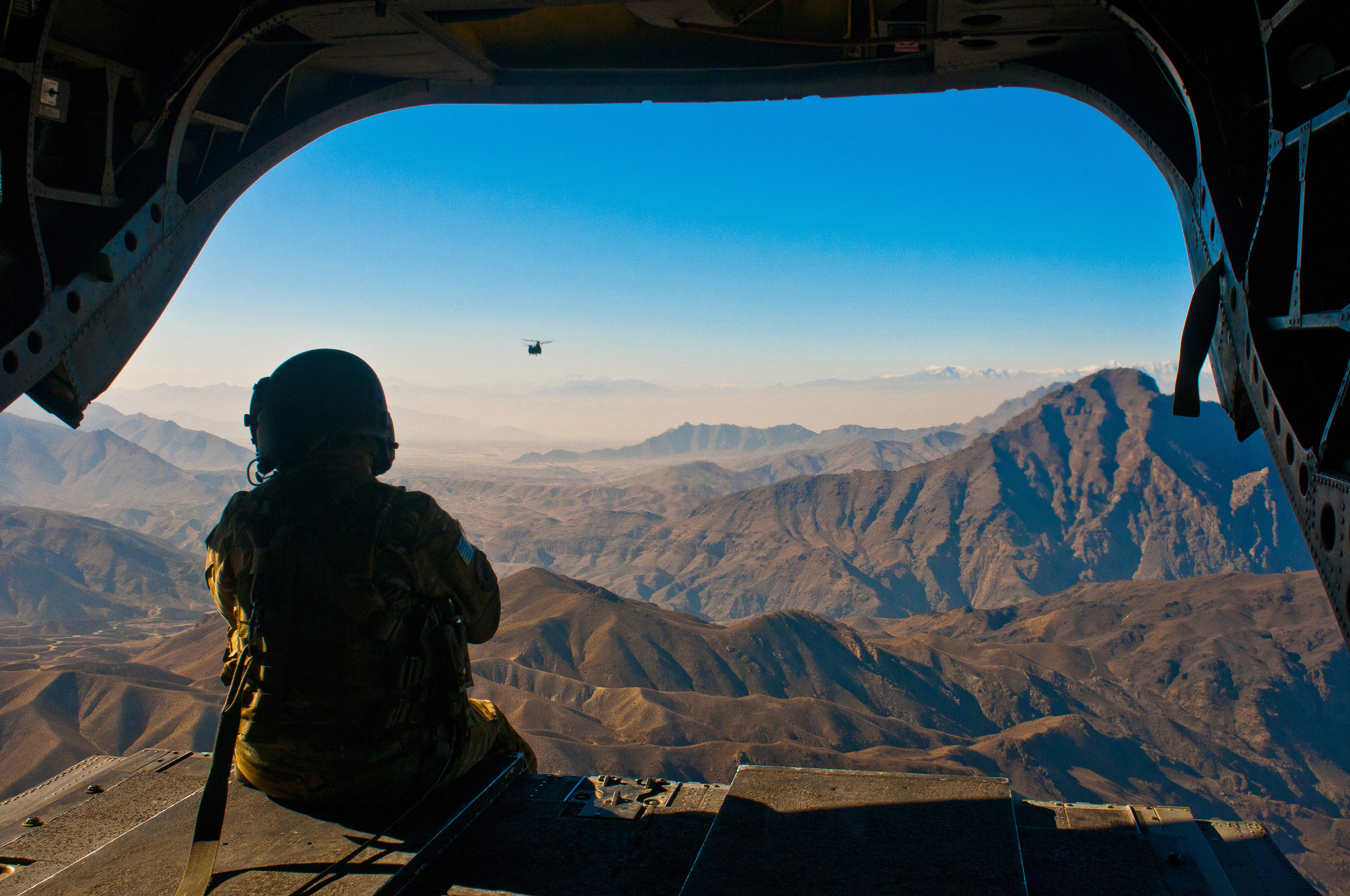
[in_content_ad]
Fourteen American service members have earned the Medal of Honor since the War in Afghanistan was formally declared on October 7, 2001, in the wake of 9/11 as part of the War on Terrorism.
Navy Senior Chief Special Warfare Operator Edward Byers
SEAL Team Six
Laghman Province | Dec. 8, 2012
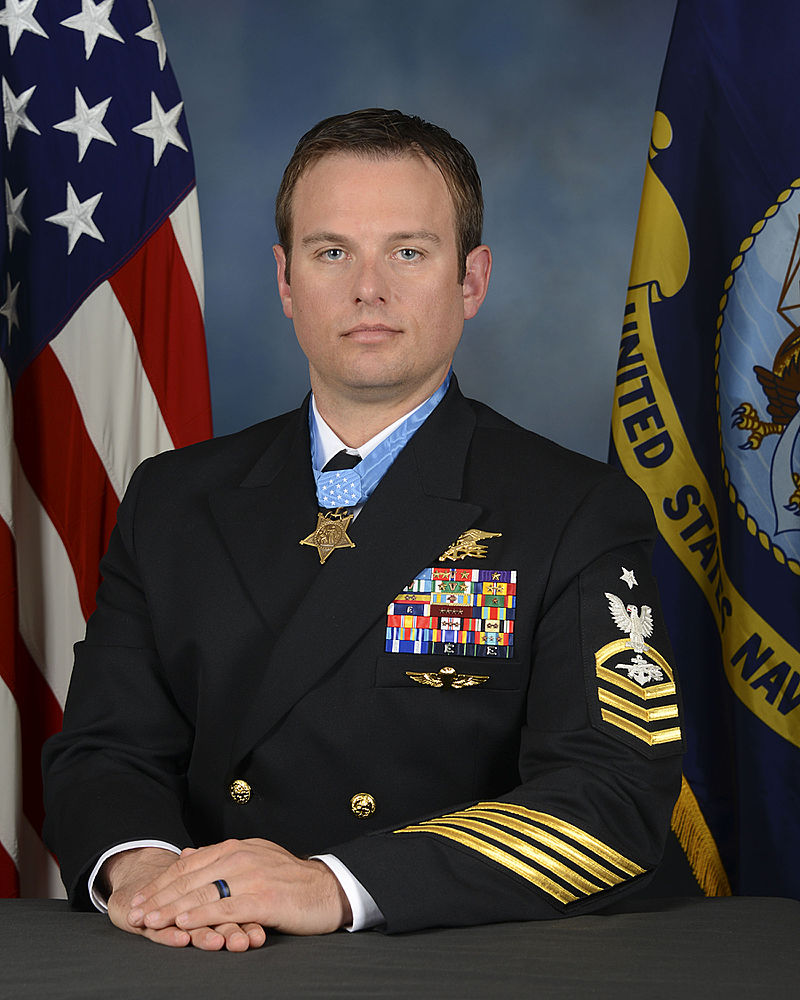
[in_content_ad]
Edward Byers is one of two Medal of Honor recipients still serving on active duty. His was awarded on 29 February 2016 for his services as part of a SEAL Team 6 rescue of an American civilian in Afghanistan in 2012. He is only the sixth SEAL to receive the Medal of Honor and as of January 2017 is the highest decorated living SEAL.
CITATION—For conspicuous gallantry and intrepidity at the risk of his life above and beyond the call of duty as a Hostage Rescue Force Team Member in Afghanistan in support of Operation ENDURING FREEDOM from 8 to 9 December 2012. As the rescue force approached the target building, an enemy sentry detected them and darted inside to alert his fellow captors. The sentry quickly reemerged, and the lead assaulter attempted to neutralize him. Chief Byers with his team sprinted to the door of the target building. As the primary breacher, Chief Byers stood in the doorway fully exposed to enemy fire while ripping down six layers of heavy blankets fastened to the inside ceiling and walls to clear a path for the rescue force. The first assaulter pushed his way through the blankets, and was mortally wounded by enemy small arms fire from within. Chief Byers, completely aware of the imminent threat, fearlessly rushed into the room and engaged an enemy guard aiming an AK-47 at him. He then tackled another adult male who had darted towards the corner of the room. During the ensuing hand-to-hand struggle, Chief Byers confirmed the man was not the hostage and engaged him. As other rescue team members called out to the hostage, Chief Byers heard a voice respond in English and raced toward it. He jumped atop the American hostage and shielded him from the high volume of fire within the small room. While covering the hostage with his body, Chief Byers immobilized another guard with his bare hands, and restrained the guard until a teammate could eliminate him. His bold and decisive actions under fire saved the lives of the hostage and several of his teammates. By his undaunted courage, intrepid fighting spirit, and unwavering devotion to duty in the face of near certain death, Chief Petty Officer Byers reflected great credit upon himself and upheld the highest traditions of the United States Naval Service.
USMC Corporal Kyle Carpenter
2nd Battalion, 9th Marines, 6th Marine Regiment, Regimental Combat Team 1, 1st Marine Division
Marjah, Helmand Province | Nov. 21, 2010
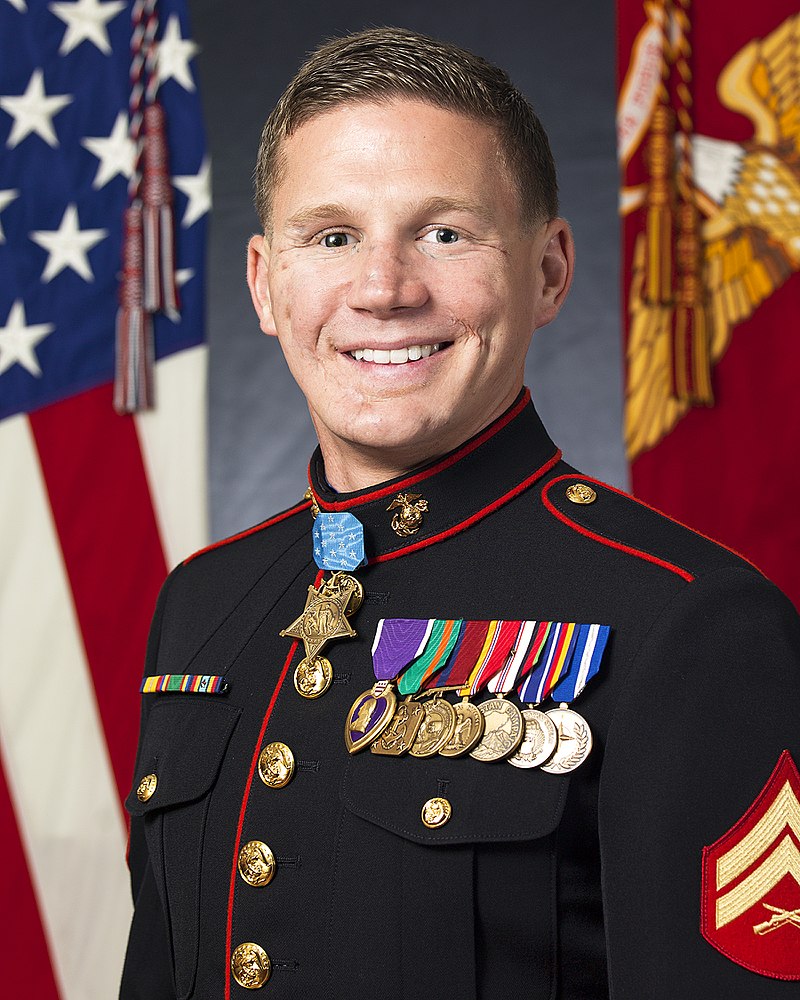
[in_content_ad]
Carpenter is the youngest living Medal of Honor recipient, earning the medal for his heroic actions in Marjah, Helmand Province in 2010 at the age of 21 when his team was attacked by the Taliban. After-action reports reveal the now medically-retired Marine threw himself in front of the enemy’s hand grenade to protect a fellow Marine.
CITATION—For conspicuous gallantry and intrepidity at the risk of his life above and beyond the call of duty while serving as an Automatic Rifleman with Company F, 2d Battalion, 9th Marines, Regimental Combat Team 1, 1st Marine Division (Forward), I Marine Expeditionary Force (Forward), in Helmand Province, Afghanistan, in support of Operation Enduring Freedom on 21 November 2010. Lance Corporal Carpenter was a member of a platoon-sized coalition force, comprised of two reinforced Marine rifle squads partnered with an Afghan National Army squad. The platoon had established Patrol Base Dakota two days earlier in a small village in the Marjah District in order to disrupt enemy activity and provide security for the local Afghan population. Lance Corporal Carpenter and a fellow Marine were manning a rooftop security position on the perimeter of Patrol Base Dakota when the enemy initiated a daylight attack with hand grenades, one of which landed inside their sandbagged position. Without hesitation and with complete disregard for his own safety, Lance Corporal Carpenter moved toward the grenade in an attempt to shield his fellow Marine from the deadly blast. When the grenade detonated, his body absorbed the brunt of the blast, severely wounding him, but saving the life of his fellow Marine. By his undaunted courage, bold fighting spirit, and unwavering devotion to duty in the face of almost certain death, Lance Corporal Carpenter reflected great credit upon himself and upheld the highest traditions of the Marine Corps and the United States Naval Service.
Army Staff Sergeant Ty Carter
3rd Squadron, 61st Cavalry Regiment, 4th Brigade Combat Team, 4th Infantry Division
Kamdesh District, Nuristan Province, Oct. 3, 2009
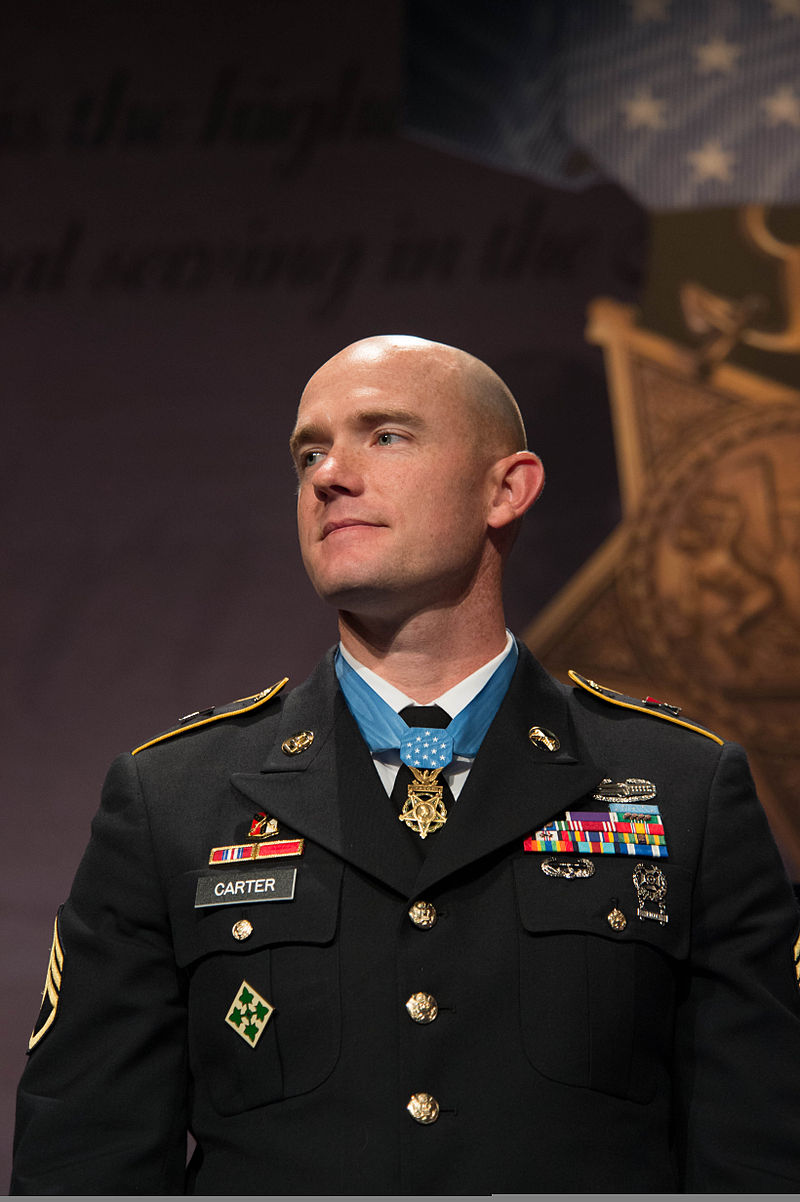
[in_content_ad]
On his first deployment to Afghanistan, Carter was among those stationed at Combat Outpost (COP) Keating in the Kamdesh District, attacked by more than 300 enemy fighters on 3 Oct. 2009. Carter would carry ammunition 100 meters across open ground to a Humvee, before repeating the distance to resupply second and third times. Despite being wounded in the first half our of battle, he kept firing in addition to providing life-extending first aid to a wounded soldier helping to carry him to safety hours after the attack began.
CITATION—Specialist Ty M. Carter distinguished himself by acts of gallantry and intrepidity at the risk of his life above and beyond the call of duty while serving as a Scout with Bravo Troop, 3d Squadron, 61st Cavalry Regiment, 4th Brigade Combat Team, 4th Infantry Division, during combat operations against an armed enemy in Kamdesh District, Nuristan Province, Afghanistan on October 3, 2009. On that morning, Specialist Carter and his comrades awakened to an attack of an estimated 300 enemy fighters occupying the high ground on all four sides of Combat Outpost Keating, employing concentrated fire from recoilless rifles, rocket propelled grenades, anti-aircraft machine guns, mortars and small arms fire. Specialist Carter reinforced a forward battle position, ran twice through a 100 meter gauntlet of enemy fire to resupply ammunition and voluntarily remained there to defend the isolated position. Armed with only an M4 carbine rifle, Specialist Carter placed accurate, deadly fire on the enemy, beating back the assault force and preventing the position from being overrun, over the course of several hours. With complete disregard for his own safety and in spite of his own wounds, he ran through a hail of enemy rocket propelled grenade and machine gun fire to rescue a critically wounded comrade who had been pinned down in an exposed position. Specialist Carter rendered life extending first aid and carried the Soldier to cover. On his own initiative, Specialist Carter again maneuvered through enemy fire to check on a fallen Soldier and recovered the squad’s radio, which allowed them to coordinate their evacuation with fellow Soldiers. With teammates providing covering fire, Specialist Carter assisted in moving the wounded Soldier 100 meters through withering enemy fire to the aid station and before returning to the fight. Specialist Carter’s heroic actions and tactical skill were critical to the defense of Combat Outpost Keating, preventing the enemy from capturing the position and saving the lives of his fellow Soldiers. Specialist Ty M. Carter’s extraordinary heroism and selflessness above and beyond the call of duty are in keeping with the highest traditions of military service and reflect great credit upon himself, Bravo Troop, 3d Squadron, 61st Cavalry Regiment, 4th Brigade Combat Team, 4th Infantry Division and the United States Army.
Army Staff Sergeant Salvatore Giunta
2nd Battalion (Airborne) 503rd Infantry Regiment, 173rd Airborne Brigade Combat Team
Korengal Valley, Kunar Province | Oct 25, 2007
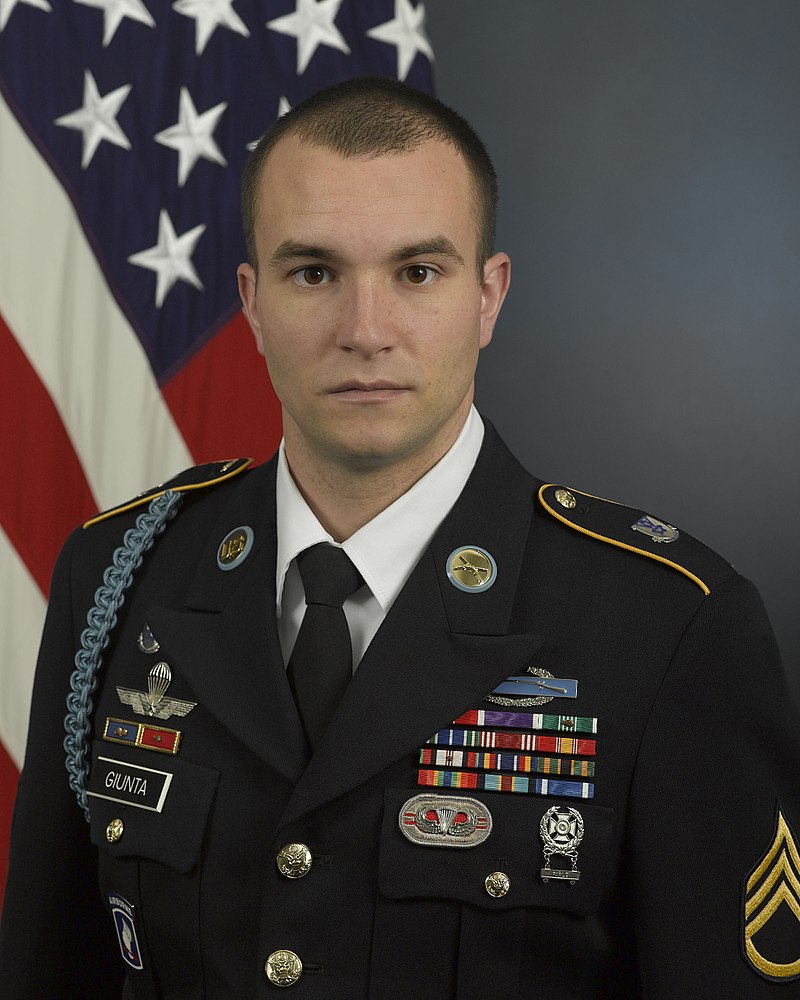
[in_content_ad]
Army Staff Sergeant Salvator Gieunta risked his life to save a wounded soldier, and his best friend, from being captured near an area of the Afghanistan-Pakistan border nicknamed by soldiers as the “Valley of Death.” He is the first living recipient of the Medal of Honor since the Vietnam War.
CITATION—Specialist Salvatore A. Giunta distinguished himself conspicuously by gallantry and intrepidity at the risk of his life above and beyond the call of duty in action with an armed enemy in the Korengal Valley, Afghanistan, on October 25, 2007. While conducting a patrol as team leader with Company B, 2d Battalion (Airborne), 503d Infantry Regiment, Specialist Giunta and his team were navigating through harsh terrain when they were ambushed by a well-armed and well-coordinated insurgent force. While under heavy enemy fire, Specialist Giunta immediately sprinted towards cover and engaged the enemy. Seeing that his squad leader had fallen and believing that he had been injured, Specialist Giunta exposed himself to withering enemy fire and raced towards his squad leader, helped him to cover, and administered medical aid. While administering first aid, enemy fire struck Specialist Giunta’s body armor and his secondary weapon. Without regard to the ongoing fire, Specialist Giunta engaged the enemy before prepping and throwing grenades, using the explosions for cover in order to conceal his position. Attempting to reach additional wounded fellow soldiers who were separated from the squad, Specialist Giunta and his team encountered a barrage of enemy fire that forced them to the ground. The team continued forward and upon reaching the wounded soldiers, Specialist Giunta realized that another soldier was still separated from the element. Specialist Giunta then advanced forward on his own initiative. As he crested the top of a hill, he observed two insurgents carrying away an American soldier. He immediately engaged the enemy, killing one and wounding the other. Upon reaching the wounded soldier, he began to provide medical aid, as his squad caught up and provided security. Specialist Giunta’s unwavering courage, selflessness, and decisive leadership while under extreme enemy fire were integral to his platoon’s ability to defeat an enemy ambush and recover a fellow American soldier from the enemy. Specialist Salvatore A. Giunta’s extraordinary heroism and selflessness above and beyond the call of duty are in keeping with the highest traditions of military service and reflect great credit upon himself, Company B, 2d Battalion (Airborne), 503d Infantry Regiment, and the United States Army.
[in_content_ad]
Army Captain Florent Groberg
12th Infantry Regiment, 4th Infantry Division
Asadabad, Kunar Province August 8, 2012
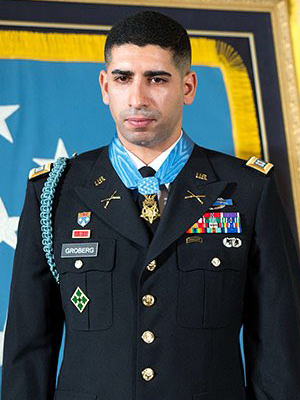
[in_content_ad]
Groberg risked his life to minimize casualities by running toward and grabbing a suicide bomber before the bomb detonated.
CITATION—Captain Florent A. Groberg distinguished himself by acts of gallantry and intrepidity at the risk of his life above and beyond the call of duty while serving as a Personal Security Detachment Commander for Task Force Mountain Warrior, 4th Infantry Brigade Combat Team, 4th Infantry Division, during combat operations against an armed enemy in Asadbad, Kunar Province, Afghanistan on August 8, 2012. On that day, Captain Groberg was leading a dismounted movement consisting of several senior leaders to include two brigade commanders, two battalion commanders, two command sergeants major, and an Afghanistan National Army brigade commander. As they approached the Provincial Governor’s compound, Captain Groberg observed an individual walking close to the formation. When the individual made an abrupt turn towards the formation, he noticed an abnormal bulge underneath the individual’s clothing. Selflessly placing himself in front of one of the brigade commanders, Captain Groberg rushed forward, using his body to push the suspect away from the formation. Simultaneously, he ordered another member of the security detail to assist with removing the suspect. At this time, Captain Groberg confirmed the bulge was a suicide vest and with complete disregard for his life, Captain Groberg again with the assistance of the other member of the security detail, physically pushed the suicide bomber away from the formation. Upon falling, the suicide bomber detonated his explosive vest outside the perimeter of the formation, killing four members of the formation and wounding numerous others. The blast from the first suicide bomber caused the suicide vest of a previously unnoticed second suicide bomber to detonate prematurely with minimal impact on the formation. Captain Groberg’s immediate actions to push the first suicide bomber away from the formation significantly minimized the impact of the coordinated suicide bombers’ attack on the formation, saving the lives of his comrades and several senior leaders. Captain Groberg’s extraordinary heroism and selflessness above and beyond the call of duty at the risk of life are in keeping with the highest traditions of military service and reflect credit upon himself, 4th Infantry Brigade Combat Team, 4th Infantry Division and the United States Army.
Marine Corps Sergeant Dakota Meyer
Embedded Training Team 2-8
Ganjgal, Kunar Province, September 8, 2009
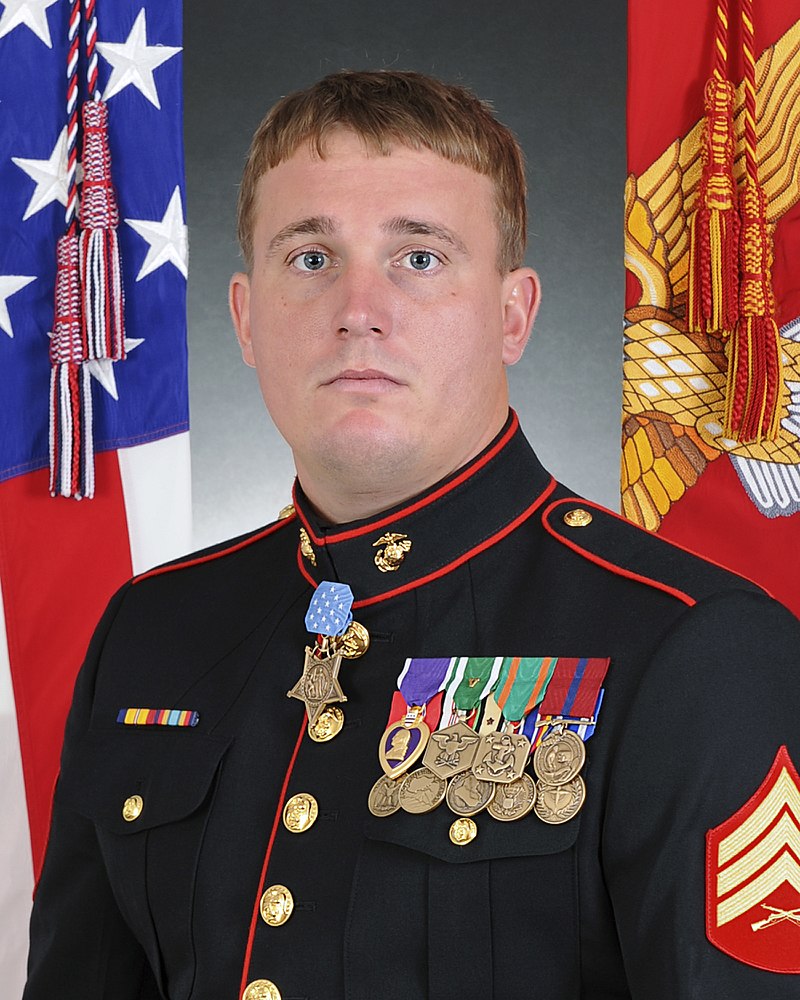
[in_content_ad]
Meyer defied order from superiors and rescued 23 Afghan Allies and 13 Americans in the Battle of Ganjgal, an act of defiance that resulted in his being the second-youngest living Medal of Honor recipient.
CITATION—For conspicuous gallantry and intrepidity at the risk of his life above and beyond the call of duty while serving with Marine Embedded Training Team 2-8, Regional Corps Advisory Command 3-7, in Kunar Province, Afghanistan, on 8 September 2009. Corporal Meyer maintained security at a patrol rally point while other members of his team moved on foot with two platoons of Afghan National Army and Border Police into the village of Ganjgal for a pre-dawn meeting with village elders. Moving into the village, the patrol was ambushed by more than 50 enemy fighters firing rocket propelled grenades, mortars, and machine guns from houses and fortified positions on the slopes above. Hearing over the radio that four U.S. team members were cut off, Corporal Meyer seized the initiative. With a fellow Marine driving, Corporal Meyer took the exposed gunner’s position in a gun-truck as they drove down the steeply terraced terrain in a daring attempt to disrupt the enemy attack and locate the trapped U.S. team. Disregarding intense enemy fire now concentrated on their lone vehicle, Corporal Meyer killed a number of enemy fighters with the mounted machine guns and his rifle, some at near point blank range, as he and his driver made three solo trips into the ambush area. During the first two trips, he and his driver evacuated two dozen Afghan soldiers, many of whom were wounded. When one machine gun became inoperable, he directed a return to the rally point to switch to another gun-truck for a third trip into the ambush area where his accurate fire directly supported the remaining U.S. personnel and Afghan soldiers fighting their way out of the ambush. Despite a shrapnel wound to his arm, Corporal Meyer made two more trips into the ambush area in a third gun-truck accompanied by four other Afghan vehicles to recover more wounded Afghan soldiers and search for the missing U.S. team members. Still under heavy enemy fire, he dismounted the vehicle on the fifth trip and moved on foot to locate and recover the bodies of his team members. Meyer’s daring initiative and bold fighting spirit throughout the 6-hour battle significantly disrupted the enemy’s attack and inspired the members of the combined force to fight on. His unwavering courage and steadfast devotion to his U.S. and Afghan comrades in the face of almost certain death reflected great credit upon himself and upheld the highest traditions of the Marine Corps and the United States Naval Service.”
Army Staff Sergeant Robert James Miller
3rd Battalion, 3rd Special Forces Group
Nari District, Kunar Province | January 25, 2008
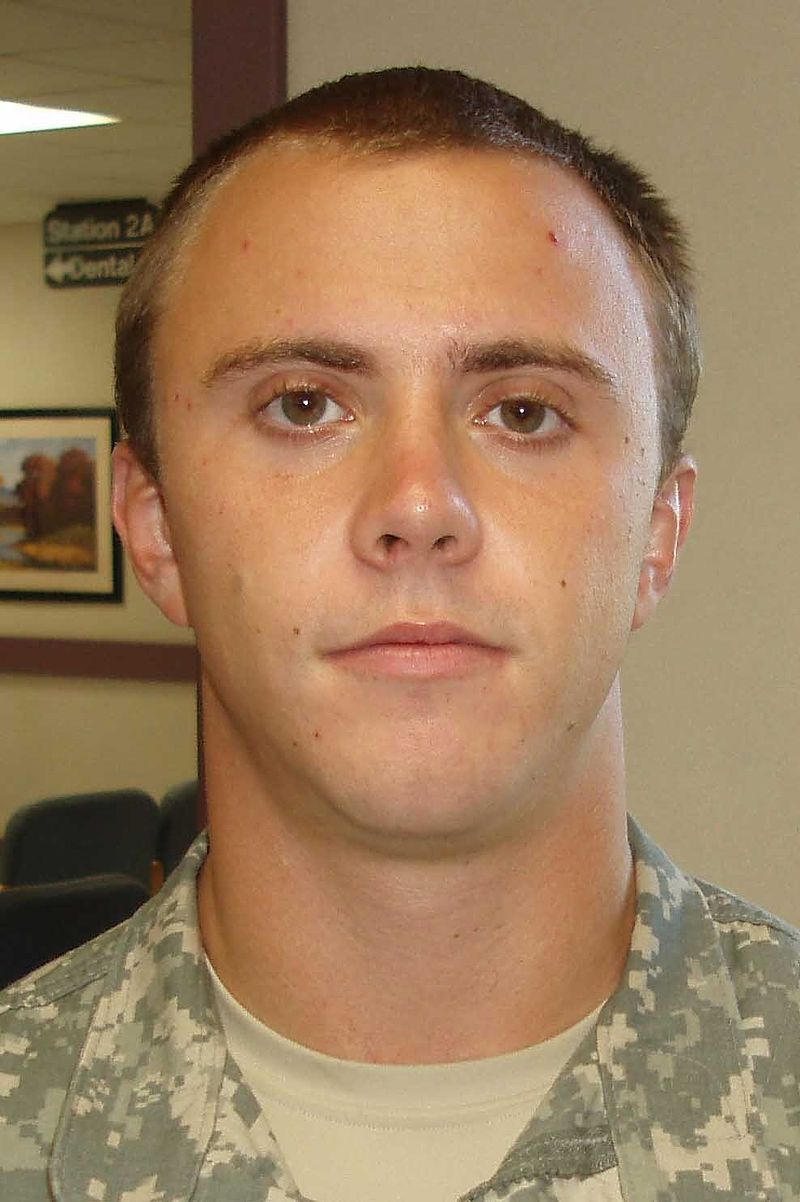
[in_content_ad]
Miller was fatally shot while selflessly diverting Taliban gunfire so that his comrades could escape.
CITATION—For conspicuous gallantry and intrepidity at the risk of his life above and beyond the call of duty: Staff Sergeant Robert J. Miller distinguished himself by extraordinary acts of heroism while serving as the Weapons Sergeant in Special Forces Operational Detachment Alpha 3312, Special Operations Task Force-33, Combined Joint Special Operations Task Force-Afghanistan during combat operations against an armed enemy in Kunar Province, Afghanistan on 25 January 2008. While conducting a combat reconnaissance patrol through the Gowardesh Valley, Staff Sergeant Miller and his small element of U.S. and Afghan National Army soldiers engaged a force of 15 to 20 insurgents occupying prepared fighting positions. Staff Sergeant Miller initiated the assault by engaging the enemy positions with his vehicle’s turret-mounted Mark-19 40 millimeter automatic grenade launcher while simultaneously providing detailed descriptions of the enemy positions to his command, enabling effective, accurate close air support. Following the engagement, Staff Sergeant Miller led a small squad forward to conduct a battle damage assessment. As the group neared the small, steep, narrow valley that the enemy had inhabited, a large, well-coordinated insurgent force initiated a near ambush, assaulting from elevated positions with ample cover. Exposed and with little available cover, the patrol was totally vulnerable to enemy rocket propelled grenades and automatic weapon fire. As point man, Staff Sergeant Miller was at the front of the patrol, cut off from supporting elements, and less than 20 meters from enemy forces. Nonetheless, with total disregard for his own safety, he called for his men to quickly move back to covered positions as he charged the enemy over exposed ground and under overwhelming enemy fire in order to provide protective fire for his team. While maneuvering to engage the enemy, Staff Sergeant Miller was shot in his upper torso. Ignoring the wound, he continued to push the fight, moving to draw fire from over one hundred enemy fighters upon himself. He then again charged forward through an open area in order to allow his teammates to safely reach cover. After killing at least 10 insurgents, wounding dozens more, and repeatedly exposing himself to withering enemy fire while moving from position to position, Staff Sergeant Miller was mortally wounded by enemy fire. His extraordinary valor ultimately saved the lives of seven members of his own team and 15 Afghanistan National Army soldiers. Staff Sergeant Miller’s heroism and selflessness above and beyond the call of duty, and at the cost of his own life, are in keeping with the highest traditions of military service and reflect great credit upon himself and the United States Army.
Army Sergeant First Class Jared C. Monti
3rd Squadron, 71st Cavalry, 3rd Brigade Combat Team, 10th Mountain Division
Gowardesh, Nuristan Province | June 21, 2006
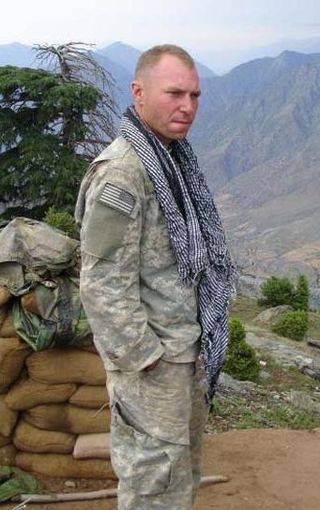
[in_content_ad]
Monti would die heroically trying to rescue a wounded soldier despite intense small arms and RPG fire.
CITATION—For conspicuous gallantry and intrepidity in action at the risk of his life above and beyond the call of duty. Sergeant First Class Monti distinguished himself at the cost of his life while serving as a team leader with the Headquarters and Headquarters Troop, 3d Squadron, 71st Cavalry Regiment in Nuristan Province, Afghanistan on 21 June 2006. On that day, Sergeant First Class Monti was leading a mission to gather intelligence and to direct fires against the enemy in support of a squadron-size interdiction mission. While at an observation position on top of a mountain ridge, Sergeant First Class Monti’s sixteen-man patrol came under attack by a superior force consisting of as many as 50 enemy fighters. On the verge of being overrun, Sergeant First Class Monti directed his patrol to set up a hasty defensive position behind a collection of rocks. He then began to call for indirect fire from a nearby support base; accurately bringing the rounds upon the enemy who had closed to within 50 meters of his position. While still calling for fire, Sergeant First Class Monti personally engaged the enemy with his rifle and a grenade, successfully disrupting an attempt to flank the patrol. Sergeant First Class Monti then realized that one of his Soldiers was lying wounded and exposed in the open ground between the advancing enemy and the patrol’s position. With complete disregard for his own safety, Sergeant First Class Monti moved from behind the cover of the rocks into the face of withering enemy fire. After closing within meters of his wounded Soldier, the heavy volume of fire forced Sergeant First Class Monti to seek cover. Sergeant First Class Monti then gathered himself and rose again to maneuver through a barrage of enemy fire to save his wounded Soldier. Again, Sergeant First Class Monti was driven back by relentless enemy fire. Unwilling to leave his Soldier wounded and exposed, Sergeant First Class Monti made another attempt to move across open terrain and through the enemy fire to the aide of his wounded Soldier. On his third attempt, Sergeant First Class Monti was mortally wounded, sacrificing his own life in an effort to save his Soldier. Sergeant First Class Monti’s acts of heroism inspired the patrol to fight off the larger enemy force. Sergeant First Class Monti’s immeasurable courage and uncommon valor were in keeping with the highest traditions of military service and reflect great credit upon himself, 3d Squadron 71st Cavalry Regiment, the 3d Brigade Combat Team, the 10th Mountain Division (Light Infantry), and the United States Army.
[in_content_ad_bannersnack]
Navy Lieutenant Michael P. Murphy
SEAL Delivery Vehicle Team 1
Near Asadabad, Kunar Province | June 28, 2005. SEAL Delivery Vehicle Team 1
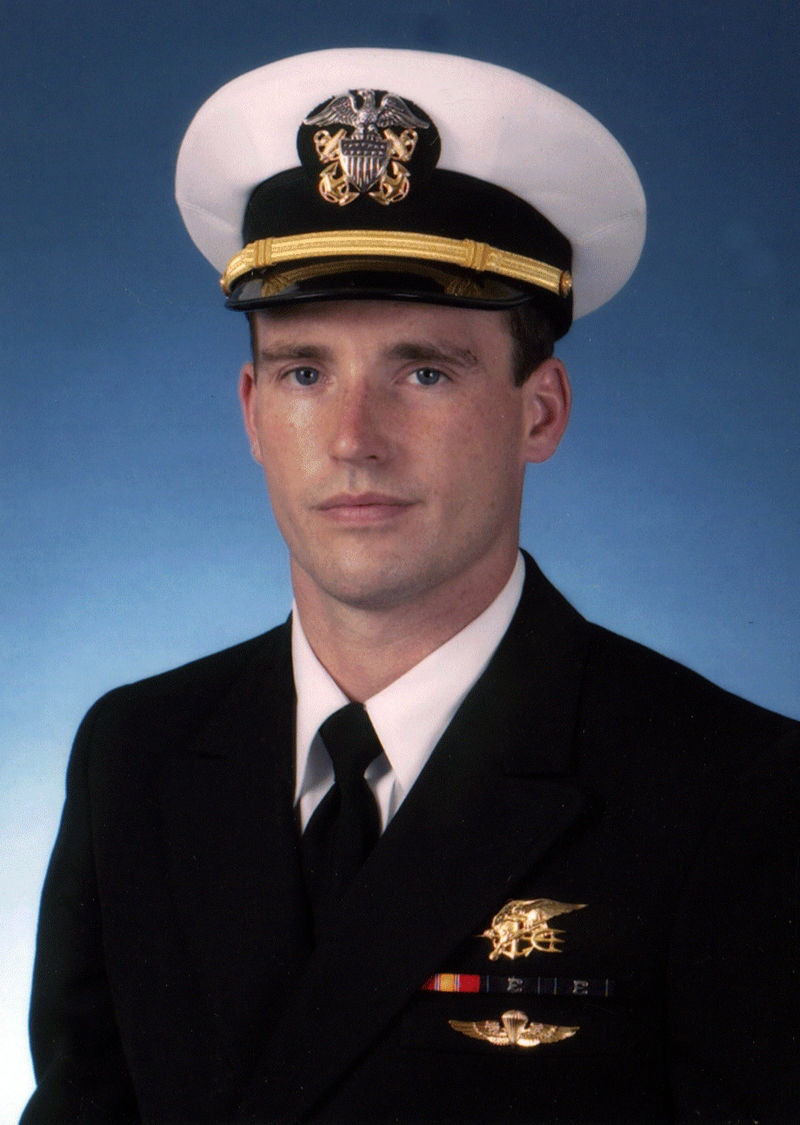
[in_content_ad]
Murphy would expose himself to enemy fire in order to call for help for his outgunned four-man reconnaissance team.
CITATION—For conspicuous gallantry and intrepidity at the risk of his life and above and beyond the call of duty as the leader of a special reconnaissance element with Naval Special Warfare task unit Afghanistan on 27 and 28 June 2005. While leading a mission to locate a high-level anti-coalition militia leader, Lieutenant Murphy demonstrated extraordinary heroism in the face of grave danger in the vicinity of Asadabad, Kunar Province, Afghanistan. On 28 June 2005, operating in an extremely rugged enemy-controlled area, Lieutenant Murphy’s team was discovered by anti-coalition militia sympathizers, who revealed their position to Taliban fighters. As a result, between 30 and 40 enemy fighters besieged his four member team. Demonstrating exceptional resolve, Lieutenant Murphy valiantly led his men in engaging the large enemy force. The ensuing fierce firefight resulted in numerous enemy casualties, as well as the wounding of all four members of the team. Ignoring his own wounds and demonstrating exceptional composure, Lieutenant Murphy continued to lead and encourage his men. When the primary communicator fell mortally wounded, Lieutenant Murphy repeatedly attempted to call for assistance for his beleaguered teammates. Realizing the impossibility of communicating in the extreme terrain, and in the face of almost certain death, he fought his way into open terrain to gain a better position to transmit a call. This deliberate, heroic act deprived him of cover, exposing him to direct enemy fire. Finally achieving contact with his headquarters, Lieutenant Murphy maintained his exposed position while he provided his location and requested immediate support for his team. In his final act of bravery, he continued to engage the enemy until he was mortally wounded, gallantly giving his life for his country and for the cause of freedom. By his selfless leadership, Lieutenant Murphy reflected great credit upon himself and upheld the highest traditions of the United States Naval Service.
Army Master Sergeant Leroy Petry
2nd Battalion 75th Ranger Regiment
Paktia Province | May 26, 2008
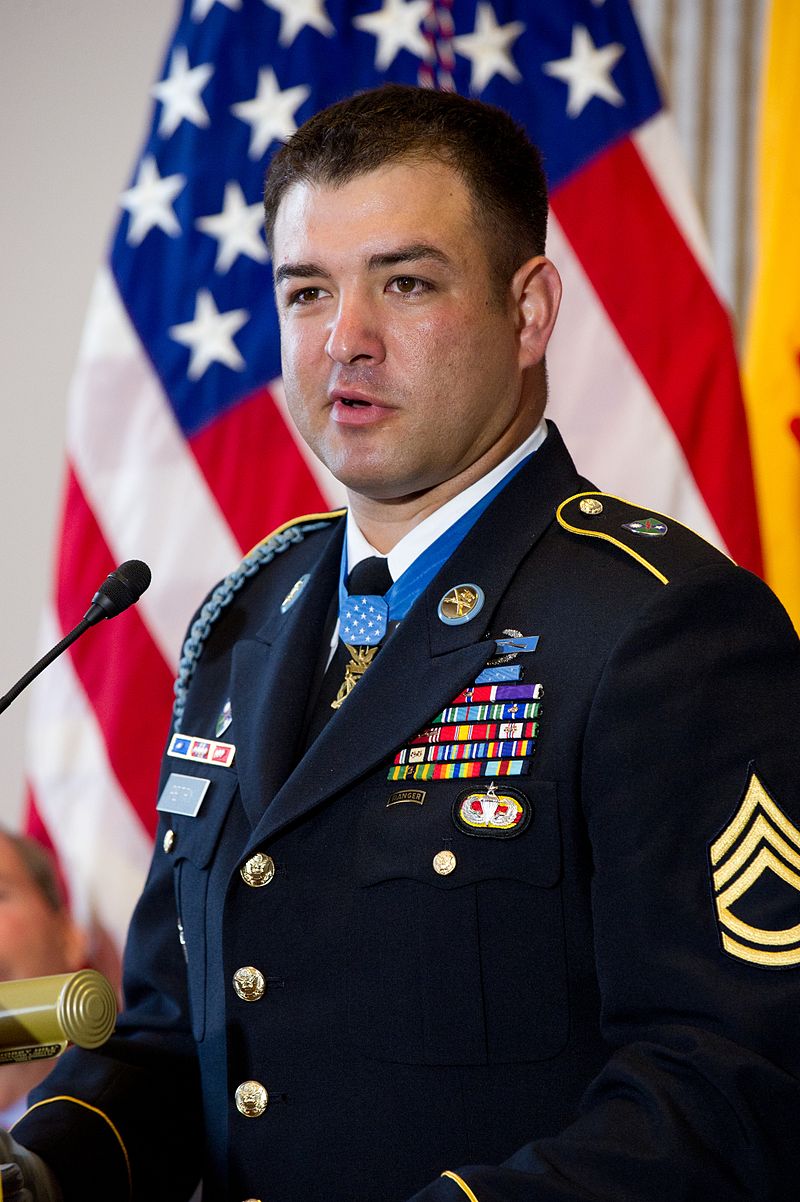
[in_content_ad]
Despite being shot through both legs, Petry would save his fellow Rangers by picking up and throwing a live enemy grenade.
CITATION—For conspicuous gallantry and intrepidity at the risk of his life above and beyond the call of duty: Staff Sergeant Leroy A. Petry distinguished himself by acts of gallantry and intrepidity at the risk of his life above and beyond the call of duty in action with an armed enemy in the vicinity of Paktya Province, Afghanistan, on May 26, 2008. As a Weapons Squad Leader with D Company, 2nd Battalion, 75th Ranger Regiment, Staff Sergeant Petry moved to clear the courtyard of a house that potentially contained high-value combatants. While crossing the courtyard, Staff Sergeant Petry and another Ranger were engaged and wounded by automatic weapons fire from enemy fighters. Still under enemy fire, and wounded in both legs, Staff Sergeant Petry led the other Ranger to cover. He then reported the situation and engaged the enemy with a hand grenade, providing suppression as another Ranger moved to his position. The enemy quickly responded by maneuvering closer and throwing grenades. The first grenade explosion knocked his two fellow Rangers to the ground and wounded both with shrapnel. A second grenade then landed only a few feet away from them. Instantly realizing the danger, Staff Sergeant Petry, unhesitatingly and with complete disregard for his safety, deliberately and selflessly moved forward, picked up the grenade, and in an effort to clear the immediate threat, threw the grenade away from his fellow Rangers. As he was releasing the grenade it detonated, amputating his right hand at the wrist and further injuring him with multiple shrapnel wounds. Although picking up and throwing the live grenade grievously wounded Staff Sergeant Petry, his gallant act undeniably saved his fellow Rangers from being severely wounded or killed. Despite the severity of his wounds, Staff Sergeant Petry continued to maintain the presence of mind to place a tourniquet on his right wrist before communicating the situation by radio in order to coordinate support for himself and his fellow wounded Rangers. Staff Sergeant Petry’s extraordinary heroism and devotion to duty are in keeping with the highest traditions of military service, and reflect great credit upon himself, 75th Ranger Regiment, and the United States Army.
Army Staff Sergeant Ryan M. Pitts
2nd Battalion (Airborne), 503rd Infantry Regiment, 173rd Airborne Brigade Combat Team
Kunar Province | July 13, 2008
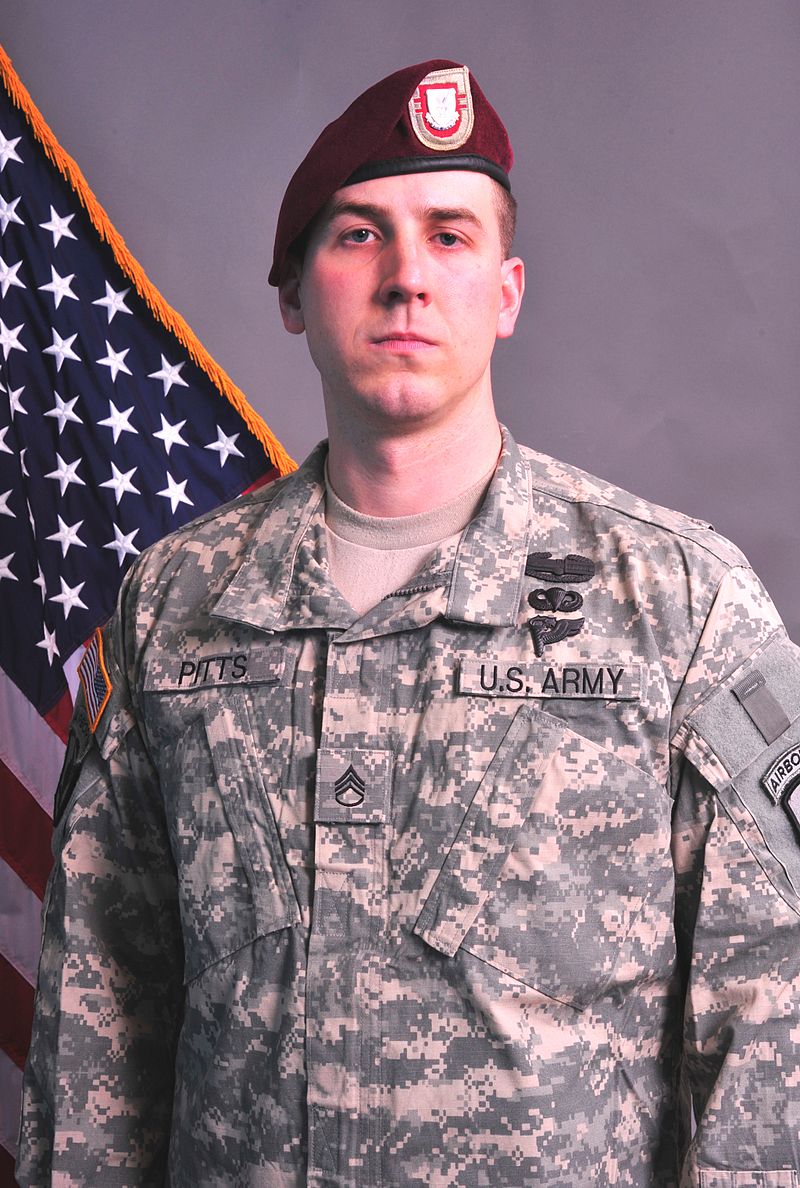
[in_content_ad]
Wounded by shrapnel and near death himself, Pitts would lob close range grenades on the enemy and crawl with no regard for his life to call for support.
CITATION—For his courageous actions while serving as a Forward Observer during the Battle of Wanat.Sergeant Ryan M. Pitts distinguished himself by extraordinary acts of heroism at the risk of his life above and beyond the call of duty while serving as a Forward Observer in 2d Platoon, Chosen Company, 2d Battalion (Airborne), 503d Infantry Regiment, 173d Airborne Brigade, during combat operations against an armed enemy at Vehicle Patrol Base Kahler in the vicinity of Wanat Village, Kunar Province, Afghanistan on July 13, 2008. Early that morning, while Sergeant Pitts was providing perimeter security at Observation Post Topside, a well-organized Anti-Afghan Force consisting of over 200 members initiated a close proximity sustained and complex assault using accurate and intense rocket-propelled grenade, machine gun and small arms fire on Wanat Vehicle Patrol Base. An immediate wave of rocket-propelled grenade rounds engulfed the Observation Post wounding Sergeant Pitts and inflicting heavy casualties. Sergeant Pitts had been knocked to the ground and was bleeding heavily from shrapnel wounds to his arm and legs, but with incredible toughness and resolve, he subsequently took control of the Observation Post and returned fire on the enemy. As the enemy drew nearer, Sergeant Pitts threw grenades, holding them after the pin was pulled and the safety lever was released to allow a nearly immediate detonation on the hostile forces. Unable to stand on his own and near death because of the severity of his wounds and blood loss, Sergeant Pitts continued to lay suppressive fire until a two-man reinforcement team arrived. Sergeant Pitts quickly assisted them by giving up his main weapon and gathering ammunition all while continually lobbing fragmentary grenades until these were expended. At this point, Sergeant Pitts crawled to the northern position radio and described the situation to the Command Post as the enemy continued to try and isolate the Observation Post from the main Patrol Base. With the enemy close enough for him to hear their voices, and with total disregard for his own life, Sergeant Pitts whispered in radio situation reports and conveyed information that the Command Post used to provide indirect fire support. Sergeant Pitts’ courage, steadfast commitment to the defense of his unit and ability to fight while seriously wounded prevented the enemy from overrunning the Observation Post and capturing fallen American soldiers, and ultimately prevented the enemy from gaining fortified positions on higher ground from which to attack Wanat Vehicle Patrol Base. Sergeant Ryan M. Pitts’ extraordinary heroism and selflessness above and beyond the call of duty are in keeping with the highest traditions of military service and reflect great credit upon himself, Company C, 2d Battalion (Airborne), 503d Infantry Regiment, 173d Airborne Brigade and the United States Army.
Army Staff Sergeant Clinton Romesha
3rd Squadron, 61st Cavalry Regiment, 4th Brigade Combat Team, 4th Infantry Division
Kamdesh, Nuristan Province | October 3, 2009
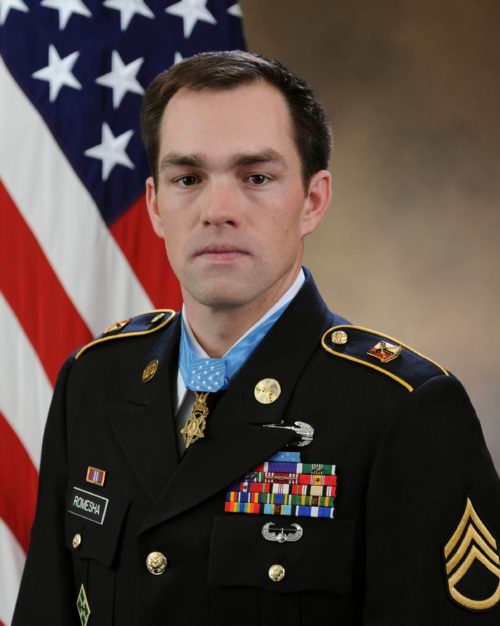
[in_content_ad]
Romesha would repeatedly risk his own life to help his fellow soldiers repel an estimated 300 enemy fighters in the Battle of Kamdesh.
CITATION—Staff Sergeant Clinton L. Romesha distinguished himself by acts of gallantry and intrepidity at the risk of his life above and beyond the call of duty while serving as a Section Leader with Bravo Troop, 3d Squadron, 61st Cavalry Regiment, 4th Brigade Combat Team, 4th Infantry Division, during combat operations against an armed enemy at Combat Outpost Keating, Kamdesh District, Nuristan Province, Afghanistan on October 3, 2009. On that morning, Staff Sergeant Romesha and his comrades awakened to an attack by an estimated 300 enemy fighters occupying the high ground on all four sides of the complex, employing concentrated fire from recoilless rifles, rocket propelled grenades, anti-aircraft machine guns, mortars and small arms fire. Staff Sergeant Romesha moved uncovered under intense enemy fire to conduct a reconnaissance of the battlefield and seek reinforcements from the barracks before returning to action with the support of an assistant gunner. Staff Sergeant Romesha took out an enemy machine gun team and, while engaging a second, the generator he was using for cover was struck by a rocket-propelled grenade, inflicting him with shrapnel wounds. Undeterred by his injuries, Staff Sergeant Romesha continued to fight and upon the arrival of another soldier to aid him and the assistant gunner, he again rushed through the exposed avenue to assemble additional soldiers. Staff Sergeant Romesha then mobilized a five-man team and returned to the fight equipped with a sniper rifle. With complete disregard for his own safety, Staff Sergeant Romesha continually exposed himself to heavy enemy fire, as he moved confidently about the battlefield engaging and destroying multiple enemy targets, including three Taliban fighters who had breached the combat outpost’s perimeter. While orchestrating a successful plan to secure and reinforce key points of the battlefield, Staff Sergeant Romesha maintained radio communication with the tactical operations center. As the enemy forces attacked with even greater ferocity, unleashing a barrage of rocket-propelled grenades and recoilless rifle rounds, Staff Sergeant Romesha identified the point of attack and directed air support to destroy over 30 enemy fighters. After receiving reports that seriously injured Soldiers were at a distant battle position, Staff Sergeant Romesha and his team provided covering fire to allow the injured Soldiers to safely reach the aid station. Upon receipt of orders to proceed to the next objective, his team pushed forward 100 meters under overwhelming enemy fire to recover and prevent the enemy fighters from taking the bodies of their fallen comrades. Staff Sergeant Romesha’s heroic actions throughout the day-long battle were critical in suppressing an enemy that had far greater numbers. His extraordinary efforts gave Bravo Troop the opportunity to regroup, reorganize and prepare for the counterattack that allowed the Troop to account for its personnel and secure Combat Outpost Keating. Staff Sergeant Romesha’s discipline and extraordinary heroism above and beyond the call of duty reflect great credit upon himself, Bravo Troop, 3d Squadron, 61st Cavalry Regiment, 4th Brigade Combat Team, 4th Infantry Division and the United States Army.
Army Major William D. Swenson
1st Battalion, 32nd Infantry Regiment, 3rd Brigade Combat Team, 10th Mountain Division
Ganjgal, Kunar Province | September 8, 2009
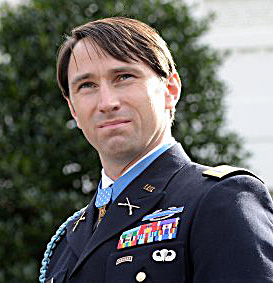
[in_content_ad]
Swenson would repeatedly risk his life to render medial aid to a fellow wounded soldier while rescuing others and recovering fallen fellow soldiers.
CITATION—For conspicuous gallantry and intrepidity at the risk of his life above and beyond the call of duty: Captain William D. Swenson distinguished himself by acts of gallantry and intrepidity at the risk of his life above and beyond the call of duty while serving as embedded advisor to the Afghan National Border Police, Task Force Phoenix, Combined Security Transition Command-Afghanistan in support of 1st Battalion, 32nd Infantry Regiment, 3rd Brigade Combat Team, 10th Mountain Division, during combat operations against an armed enemy in Kunar Province, Afghanistan on September 8, 2009. On that morning, more than 60 well-armed, well-positioned enemy fighters ambushed Captain Swenson’s combat team as it moved on foot into the village of Ganjgal for a meeting with village elders. As the enemy unleashed a barrage of rocket-propelled grenade, mortar and machine gun fire, Captain Swenson immediately returned fire and coordinated and directed the response of his Afghan Border Police, while simultaneously calling in suppressive artillery fire and aviation support. After the enemy effectively flanked Coalition Forces, Captain Swenson repeatedly called for smoke to cover the withdrawal of the forward elements. Surrounded on three sides by enemy forces inflicting effective and accurate fire, Captain Swenson coordinated air assets, indirect fire support and medical evacuation helicopter support to allow for the evacuation of the wounded. Captain Swenson ignored enemy radio transmissions demanding surrender and maneuvered uncovered to render medical aid to a wounded fellow soldier. Captain Swenson stopped administering aid long enough to throw a grenade at approaching enemy forces, before assisting with moving the soldier for air evacuation. With complete disregard for his own safety, Captain Swenson unhesitatingly led a team in an unarmored vehicle into the kill zone, exposing himself to enemy fire on at least two occasions, to recover the wounded and search for four missing comrades. After using aviation support to mark locations of fallen and wounded comrades, it became clear that ground recovery of the fallen was required due to heavy enemy fire on helicopter landing zones. Captain Swenson’s team returned to the kill zone another time in a Humvee. Captain Swenson voluntarily exited the vehicle, exposing himself to enemy fire, to locate and recover three fallen Marines and one fallen Navy corpsman. His exceptional leadership and stout resistance against the enemy during six hours of continuous fighting rallied his teammates and effectively disrupted the enemy’s assault. Captain William D. Swenson’s extraordinary heroism and selflessness above and beyond the call of duty are in keeping with the highest traditions of military service and reflect great credit upon himself, Task Force Phoenix, 1st Battalion, 32nd Infantry Regiment, 3rd Brigade Combat Team, 10th Mountain Division and the United States Army.
Army Sergeant Kyle White
2nd Battalion (Airborne), 503rd Infantry Regiment, 173rd Airborne Brigade Combat Team
Nuristan Province | November 9, 2007
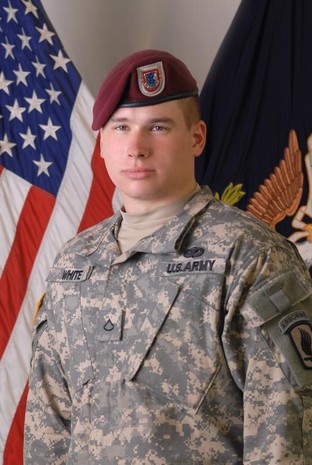
[in_content_ad]
White would repeatedly risk his life to provide medial aid to wounded soldiers in addition to radioing situation reports enabling both counterattack and rescue operations.
CITATION—The President of the United States of America, authorized by Act of Congress, March 3, 1863, has awarded in the name of Congress the Medal of Honor to Specialist Kyle J. White, United States Army. Specialist Kyle J. White distinguished himself by acts of gallantry and intrepidity at the risk of his life above and beyond the call of duty while serving as a radio telephone operator with Company C, 2nd Battalion Airborne, 503rd Infantry Regiment, 173rd Airborne Brigade during combat operations against an armed enemy in Nuristan Province, Afghanistan on November 9, 2007. On that day, Specialist White and his comrades were returning to Bella Outpost from a shura with Aranas village elders. As the soldiers traversed a narrow path surrounded by mountainous, rocky terrain, they were ambushed by enemy forces from elevated positions. Pinned against a steep mountain face, Specialist White and his fellow soldiers were completely exposed to enemy fire. Specialist White returned fire and was briefly knocked unconscious when a rocket-propelled grenade impacted near him. When he regained consciousness, another round impacted near him, embedding small pieces of shrapnel in his face. Shaking off his wounds, Specialist White noticed one of his comrades lying wounded nearby. Without hesitation, Specialist White exposed himself to enemy fire in order to reach the soldier and provide medical aid. After applying a tourniquet, Specialist White moved to an injured Marine, providing aid and comfort until the Marine succumbed to his wounds. Specialist White then returned to the soldier and discovered that he had been wounded again. Applying his own belt as an additional tourniquet, Specialist White was able to stem the flow of blood and save the soldier’s life. Noticing that his and the other soldiers’ radios were inoperative, Specialist White exposed himself to enemy fire yet again in order to secure a radio from a deceased comrade. He then provided information and updates to friendly forces, allowing precision airstrikes to stifle the enemy’s attack and ultimately permitting medical evacuation aircraft to rescue him, his fellow soldiers, Marines, and Afghan army soldiers. Specialist Kyle J. White. Extraordinary heroism and selflessness above and beyond the call of duty are in keeping with the highest traditions of military service and reflect great credit upon himself, Company C, 2nd Battalion Airborne, 503rd Infantry Regiment, 173rd Airborne Brigade, and the United States Army.
War in Iraq
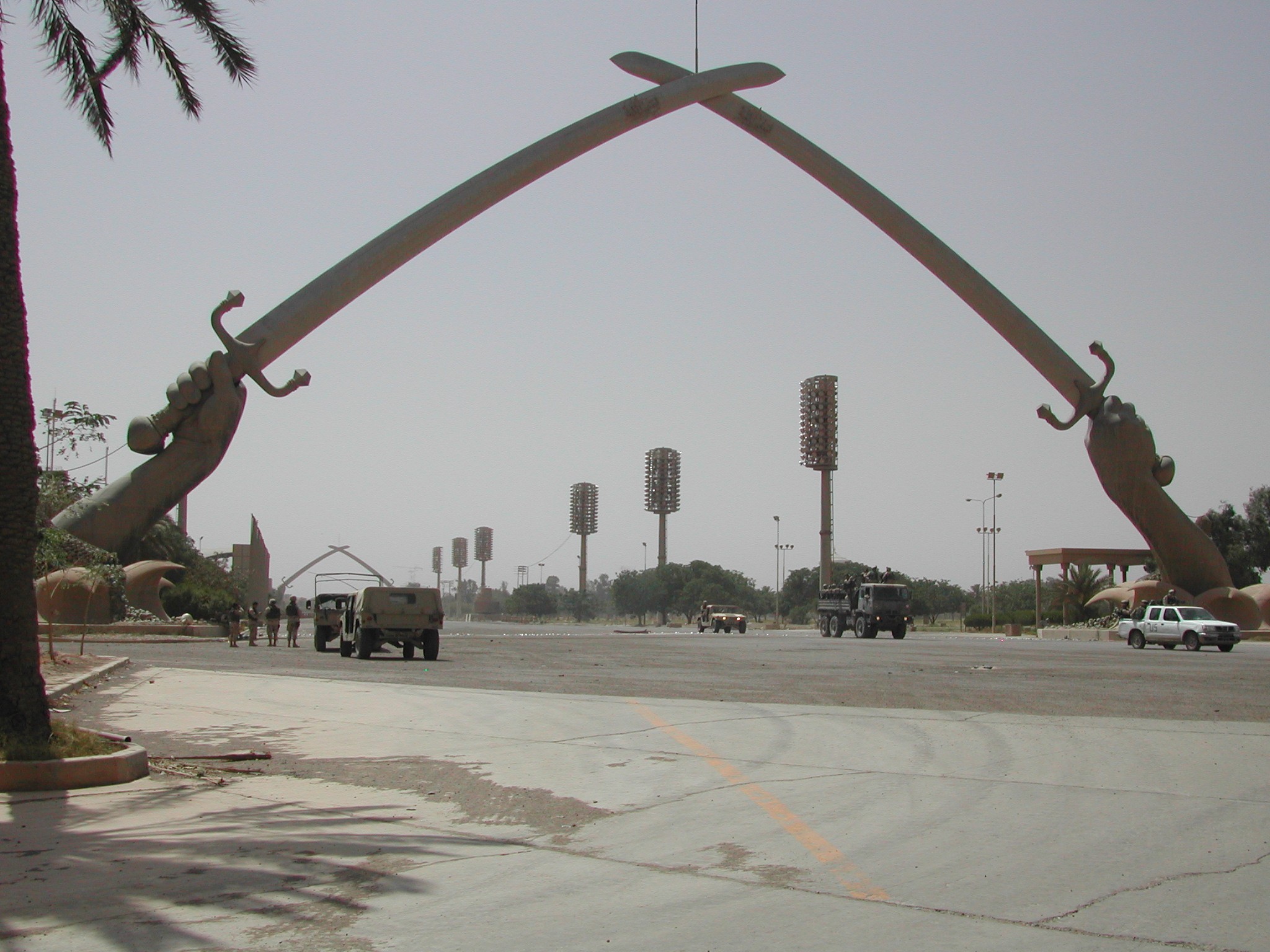
[in_content_ad]
Operation Iraqi Freedom began on Mar. 20, 2003 with a U.S.-led coalition invasion of Iraq. Four service members have received a MoH for their actions in Iraq. All posthumous.
Marine Corps Corporal Jason Dunham
3rd Battalion 7th Marines
Iraq, near Syrian border | April 14, 2004
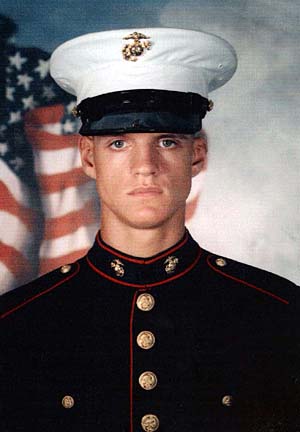
[in_content_ad]
Dunham fought hand-to-hand with the enemy before hurling himself on a grenade to protect fellow Marines. He would die from the resulting injuries.
CITATION—For conspicuous gallantry and intrepidity at the risk of his life above and beyond the call of duty while serving as Rifle Squad Leader, 4th Platoon, Company K, Third Battalion, Seventh Marines (Reinforced), Regimental Combat Team 7, First Marine Division (Reinforced), on 14 April 2004. Corporal Dunham’s squad was conducting a reconnaissance mission in the town of Karabilah, Iraq, when they heard rocket-propelled grenade and small arms fire erupt approximately two kilometers to the west. Corporal Dunham led his Combined Anti-Armor Team towards the engagement to provide fire support to their Battalion Commander’s convoy, which had been ambushed as it was traveling to Camp Husaybah. As Corporal Dunham and his Marines advanced, they quickly began to receive enemy fire. Corporal Dunham ordered his squad to dismount their vehicles and led one of his fire teams on foot several blocks south of the ambushed convoy. Discovering seven Iraqi vehicles in a column attempting to depart, Corporal Dunham and his team stopped the vehicles to search them for weapons. As they approached the vehicles, an insurgent leaped out and attacked Corporal Dunham. Corporal Dunham wrestled the insurgent to the ground and in the ensuing struggle saw the insurgent release a grenade. Corporal Dunham immediately alerted his fellow Marines to the threat. Aware of the imminent danger and without hesitation, Corporal Dunham covered the grenade with his helmet and body, bearing the brunt of the explosion and shielding his Marines from the blast. In an ultimate and selfless act of bravery in which he was mortally wounded, he saved the lives of at least two fellow Marines. By his undaunted courage, intrepid fighting spirit, and unwavering devotion to duty, Corporal Dunham gallantly gave his life for his country, thereby reflecting great credit upon himself and upholding the highest traditions of the Marine Corps and the United States Naval Service”.
Army Specialist Ross A. McGinnis
C Company, 1-26th Infantry, 1st Infantry Division
Adhamiyah, Iraq | December 4, 2006
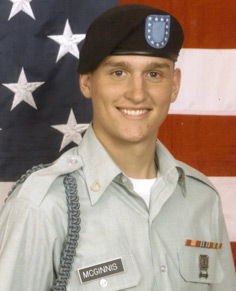
[in_content_ad]
McGinnis selflessly saved the lives of four of his fellow soldiers by diving on a grenade while inside a Humvee.
CITATION—Private First Class Ross A. McGinnis distinguished himself by acts of gallantry and intrepidity above and beyond the call of duty while serving as an M2 .50-caliber Machine Gunner, 1st Platoon, C Company, 1st Battalion, 26th Infantry Regiment, in connection with combat operations against an armed enemy in Adhamiyah, Northeast Baghdad, Iraq, on December 4, 2006. That afternoon his platoon was conducting combat control operations in an effort to reduce and control sectarian violence in the area. While Private McGinnis was manning the M2 .50-caliber Machine Gun, a fragmentation grenade thrown by an insurgent fell through the gunner’s hatch into the vehicle. Reacting quickly, he yelled “grenade,” allowing all four members of his crew to prepare for the grenade’s blast. Then, rather than leaping from the gunner’s hatch to safety, Private McGinnis made the courageous decision to protect his crew. In a selfless act of bravery, in which he was mortally wounded, Private McGinnis covered the live grenade, pinning it between his body and the vehicle and absorbing most of the explosion. Private McGinnis’ gallant action directly saved four men from certain serious injury or death. Private First Class McGinnis’ extraordinary heroism and selflessness at the cost of his own life, above and beyond the call of duty, are in keeping with the highest traditions of the military service and reflect great credit upon himself, his unit, and the United States Army.
Navy Master-at-Arms Second Class Michael A. Monsoor
SEAL Team Three, Delta Platoon
Ramadi, Iraq | September 29, 2006
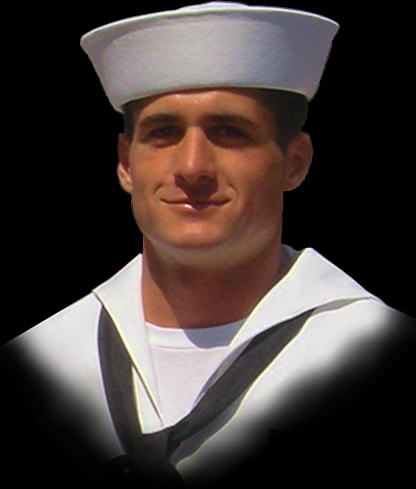
[in_content_ad]
Monsoor saved the lives of his fellow SEALs at his sniper position by diving on a grenade.
CITATION—For conspicuous gallantry and intrepidity at the risk of his life above and beyond the call of duty while serving as Automatic Weapons Gunner for Naval Special Warfare Task Group Arabian Peninsula, in support of Operation IRAQI FREEDOM on 29 September 2006. As a member of a combined SEAL and Iraqi Army sniper overwatch element, tasked with providing early warning and stand-off protection from a rooftop in an insurgent-held sector of Ar Ramadi, Iraq, Petty Officer Monsoor distinguished himself by his exceptional bravery in the face of grave danger. In the early morning, insurgents prepared to execute a coordinated attack by reconnoitering the area around the element’s position. Element snipers thwarted the enemy’s initial attempt by eliminating two insurgents. The enemy continued to assault the element, engaging them with a rocket-propelled grenade and small arms fire. As enemy activity increased, Petty Officer Monsoor took position with his machine gun between two teammates on an outcropping of the roof. While the SEALs vigilantly watched for enemy activity, an insurgent threw a hand grenade from an unseen location, which bounced off Petty Officer Monsoor’s chest and landed in front of him. Although only he could have escaped the blast, Petty Officer Monsoor chose instead to protect his teammates. Instantly and without regard for his own safety, he threw himself onto the grenade to absorb the force of the explosion with his body, saving the lives of his two teammates. By his undaunted courage, fighting spirit, and unwavering devotion to duty in the face of certain death, Petty Officer Monsoor gallantly gave his life for his country, thereby reflecting great credit upon himself and upholding the highest traditions of the United States Naval Service.
Army Sergeant First Class Paul R. Smith
11th Engineer Battalion, 3rd Infantry Division
Saddam International Airport | April 4, 2003
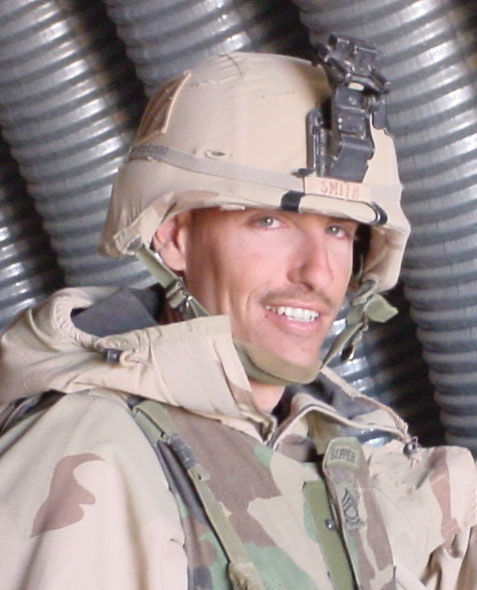
[in_content_ad]
Engaged in the construction of a prisoner of war holding area when attacked, Smith would die after organizing a defense and throwing grenades and returning small arms fire allowing the wounded to be carried out of battle.
CITATION–Sergeant First Class Paul R. Smith distinguished himself by acts of gallantry and intrepidity above and beyond the call of duty in action with an armed enemy near Baghdad International Airport, Baghdad, Iraq on April 4, 2003. On that day, Sergeant First Class Smith was engaged in the construction of a prisoner of war holding area when his Task Force was violently attacked by a company-sized enemy force. Realizing the vulnerability of over 100 soldiers, Sergeant First Class Smith quickly organized a hasty defense consisting of two platoons of soldiers, one Bradley Fighting Vehicle and three armored personnel carriers. As the fight developed, Sergeant First Class Smith braved hostile enemy fire to personally engage the enemy with hand grenades and anti-tank weapons, and organized the evacuation of three wounded soldiers from an armored personnel carrier struck by a rocket propelled grenade and a 60 mm mortar round. Fearing the enemy would overrun their defenses, Sergeant First Class Smith moved under withering enemy fire to man a .50 caliber machine gun mounted on a damaged armored personnel carrier. In total disregard for his own life, he maintained his exposed position in order to engage the attacking enemy force. During this action, he was mortally wounded. His courageous actions helped defeat the enemy attack, and resulted in as many as 50 enemy soldiers killed, while allowing the safe withdrawal of numerous wounded soldiers. Sergeant First Class Smith’s extraordinary heroism and uncommon valor are in keeping with the highest traditions of the military service and reflect great credit upon himself, the Third Infantry Division ‘Rock of the Marne,’ and the United States Army.
















